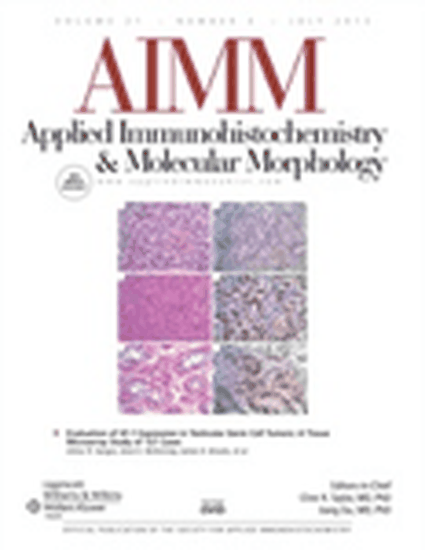
Article
LEF-1 is frequently expressed in colorectal carcinoma and not in other gastrointestinal tract adenocarcinomas: an immunohistochemical survey of 602 gastrointestinal tract neoplasms.
Applied Immunohistochemistry & Molecular Morphology
(2014)
Abstract
LEF-1 is a DNA-binding protein that interacts with β-catenin and activates Wnt-responsive target genes. We analyzed the immunohistochemical expression of LEF-1 in 602 gastrointestinal and pancreatobiliary neoplasms in an attempt to (1) investigate the utility of LEF-1 immunohistochemistry as an ancillary marker in gastrointestinal/pancreatobiliary neoplasia, and (2) to perform a clinicopathologic and survival analysis of colorectal carcinoma stratified by LEF-1 expression. LEF-1 nuclear positivity was frequently identified in colorectal carcinoma (89/241, 37%) and only infrequently identified in other neoplasms: 11% esophagus/esophagogastric adenocarcinomas, 7% gastric adenocarcinomas, 1% pancreatic ductal adenocarcinomas, 4% pancreatic intraductal papillary mucinous neoplasms, and in no cases of appendiceal mucinous neoplasms or pancreatic mucinous cystic neoplasms. LEF-1 expression was identified in 35% of colorectal carcinomas that lacked CK20 and CDX2 expression. In colorectal carcinomas, LEF-1-positive tumors more frequently harbored KRAS mutations compared with LEF-1-negative tumors (39% vs. 16%, P=0.005). Patients with moderate/strong LEF-1-positive colorectal carcinoma had a trend of worse overall survival compared with patients with colorectal carcinomas with weak/negative LEF-1 expression (5 y overall survival, 31% vs. 47%, P=0.15). In conclusion, LEF-1 is most commonly expressed in colorectal carcinoma and infrequently observed in the upper gastrointestinal tract and pancreatic adenocarcinoma. LEF-1 Immunohistochemistry may be especially useful as an ancillary diagnostic marker in colorectal carcinomas, which lack the expression of both CK20 and CDX2. LEF-1 expression is associated with the presence of KRAS mutations and may have prognostic value as a trend of worse overall survival is seen in patients with LEF-1-positive colorectal carcinoma.
Disciplines
Publication Date
November 1, 2014
DOI
10.1097/PAI.0000000000000109
Citation Information
Kermanshahi TR, Jayachandran P, Chang DT, Pai R. LEF-1 is frequently expressed in colorectal carcinoma and not in other gastrointestinal tract adenocarcinomas: an immunohistochemical survey of 602 gastrointestinal tract neoplasms. Appl Immunohistochem Mol Morphol. 2014 Nov-Dec;22(10):728-34. doi: 10.1097/PAI.0000000000000109. PMID: 25394300.
